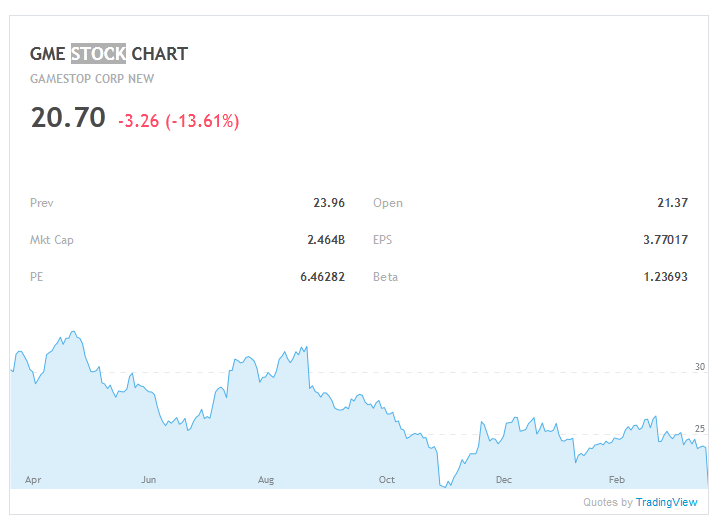First things first: don’t buy GME. Just don’t do it. It’ll only end in tears.
What follows is not a consideration of the pros and cons of buying Gamestop in 2017. It’s a cautionary tale of what happens when a company doesn’t understand its own changing marketplace. It’s an admonition to only sell what people want to buy. It’s a reminder not to jump aboard a sinking ship.
It’s not that people don’t want videogames. They totally do. The problem is that GameStop (NYSE:GME) is no longer the preferred marketplace, and they’re not selling the format of the future.
Gamestop, my friends, is the new Blockbuster. Click that very first “GameStop” link if you want to see the writing on the wall.
A Deeper Look at GameStop
If you’re old enough to run for Congress, you remember Babbage’s, GameStop’s former corporate moniker. Babbage’s was founded in 1984, long before most of GameStop’s current customers were born. Back then, it was the record store of video games – a place to gather with like-minded obsessives to handle game cartridges with trembling fingers, trade in used consoles, and play the newest gaming experiences launched by the world’s sexiest developers.
Some people still use GameStop for this purpose. One of their 7500 stores is probably humming along within a couple of miles of where you are currently sitting. But market ubiquity doesn’t equate to market dominance, as GameStop investors are finally learning after a long, slow decline.
GameStop just closed 150 stores. That’s only 2% of their total locations, but it’s not a good sign. Another bad sign is the bankruptcy of Radio Shack, a company they bought just last year.
GameStop has a lot of cash on hand (roughly $150 million) and a very high dividend yield for stockholders (7.34%!), but that’s about all the good news I’m finding. The rest is a the story of a dinosaur trying to survive in a strange new world.
What’s Stealing GameStop’s Thunder?
Digital distribution is sucking the lifeblood out of GameStop. As surely as Netflix (NASDAQ:NFLX) skewered Blockbuster, and Spotify wiped out the era of record stores, Steam and the rest of the digital distribution models are turning GME into a husk.
The two major gaming consoles are equipped with 8TB of storage. Cartridge and Disk gaming is on its way out. GameStop is all about convenience. They still have deals with developers to release the hottest new games first. But, if you’re willing to wait two days, you can usually get the same game on Amazon (NASDAQ:AMZN) for 20% off. With free same-day shipping. GameStop has also made a lot of its money brokering used game transactions. That’s not something we’ll need when everyone is using digital distributors. Why do we want to lace up our shoes for a walk to GameStop again?
The gaming industry is also changing in favor of independent developers. Back in the 90’s when people only had access to a handful of marketing channels, we bought what we were sold. Today, gamers are more sophisticated. They want what’s new. They want what’s fun. They don’t care if the hottest thing is not also the most expensive thing. Big releases have carried GameStop in the past, but that’s exactly what they represent: the past.
Should You Buy GME?
GameStop is not the worst-run company in the world. Their financials are about as good as you could hope, considering changes in the industry and in consumer tastes.
Nonetheless, I would be shocked if their growth years are not completely behind them. I grew up in a time when stores like Babbage’s were a warm, exciting place to make friends and play cool games. But that’s not the way things are done anymore. I wouldn’t buy GME at half its price.
As always, feel free to disagree. What do you think?

